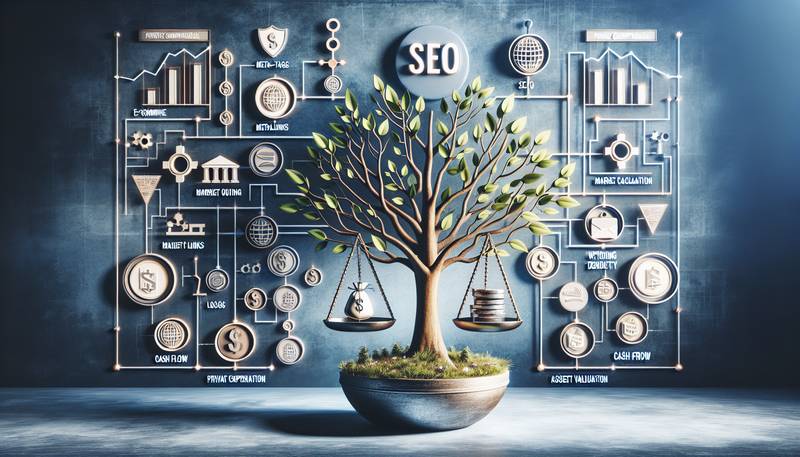How Strong SEO Impacts Valuation

SEO: Not Just Another AcronymWhen considering business valuations, one might think of spreadsheets, balance sheets, and a cup of strong coffee to wash it all down. Surprisingly, tucked between all those numbers is a digital powerhouse known as SEO, or Search Engine Optimization. Seems mundane, right? Try telling that to a business that gets buried on page five of search results—where dreams go to die! SEO isn’t just a collection of buzzwords thrown together by marketing folks trying to sound smarter than they really are; it’s a critical ingredient in determining a company's market value. A well-optimized online presence can boost visibility, increase traffic, and ultimately make a business more appealing to potential buyers. Think of it as the digital equivalent of putting a 'Freshly Baked Cookies' sign outside your shop, minus the need for actual baking (and the risk of burning them).The Power of VisibilityVisibility in the online world isn’t a mere footnote; it's the main chapter. The higher a website ranks in search results, the more visitors it attracts. This influx of potential customers can lead to increased sales and, consequently, a bump in valuation. It’s like throwing a party and realizing you forgot to send out invitations—no one shows up, and the value of a good time decreases significantly.A strong SEO strategy can transform a company's online presence with the following benefits: - Increased organic traffic: More visitors, more potential customers.
- Improved brand credibility: Ranking higher lends authority and trustworthiness.
- Cost-effectiveness: Unlike PPC ads, organic traffic doesn’t come with a bill every month.
- Competitive advantage: Standing out is crucial in a crowded marketplace.
Let’s be real. Businesses don’t just want visitors; they want the right visitors. You wouldn’t invite a cat to a dog party, after all. It’s crucial to target your audience effectively so you don’t end up with a bunch of confused onlookers who just clicked on your link out of sheer curiosity.SEO's Role in the Valuation EquationValuation can often feel like trying to solve a Rubik's Cube blindfolded—there are too many variables. However, savvy investors recognize the significance of a robust SEO strategy in their evaluations. A company that ranks on the first page is often considered more valuable. Why? Because it indicates strong marketing practices and the ability to attract and retain customers.Investors look for signals of potential growth. If a company has a solid online presence but hasn’t capitalized on it yet, that’s a treasure chest waiting to be unlocked. The potential for increased revenue through effective SEO can make a company highly attractive during negotiations. After all, no one wants to invest in a business that’s as lost online as a tourist without a map.Long-Term Gains Over Short-Term WinsWhile some businesses might opt for quick fixes—like paid ads that disappear once the budget runs dry—SEO is a long game played over time. Building authority and credibility through content marketing or backlink strategies isn’t like ordering fast food; it requires patience and consistency.Those who understand this will see the benefits accumulate like coins in a piggy bank. Over time, a well-executed SEO strategy can yield compounding returns, increasing both traffic and valuation. Companies should prioritize creating valuable content and engaging with their audience to ensure that their online footprint grows steadily and substantially.SEO: A Business’s Best FriendThink of SEO as a loyal dog; it may take time to train, but the rewards are well worth the effort. As businesses continually refine their online approaches and utilize SEO best practices, they’re not just improving their search rankings—they are positively affecting their bottom line and making themselves more appealing to potential buyers.Investors will keep a keen eye on how well a company leverages its SEO strategy. After all, if a business can’t even promote itself online, how will it promote its products or services effectively? It’s akin to a magician who can’t pull a rabbit from a hat—impressive in theory, but ultimately lacking in execution. Taking a Page from the SEO PlaybookCompanies must embrace SEO as a vital business strategy rather than just a technical requirement. Here are a few tips for enhancing SEO that any business can take to heart: - Regularly update website content to keep it fresh and engaging.
- Optimize for mobile, as users aren’t just glued to their desktops anymore.
- Focus on quality backlinks to boost authority.
- Engage with customers through social media to drive traffic.
Neglecting SEO is like attempting a three-legged race while hopping on one foot. It may sound amusing until the finish line comes into view, and you realize you’re still at the starting line.It's All About the Value PropositionA well-executed SEO strategy can elevate a business from obscurity to prominence, making it significantly more valuable in the eyes of investors. Just remember, the better the online presence, the higher the valuation, and the more likely a company will thrive. Thanks to SEO, businesses can be as sought after as the last slice of pizza at a party—and who wouldn’t want that?
|
|







